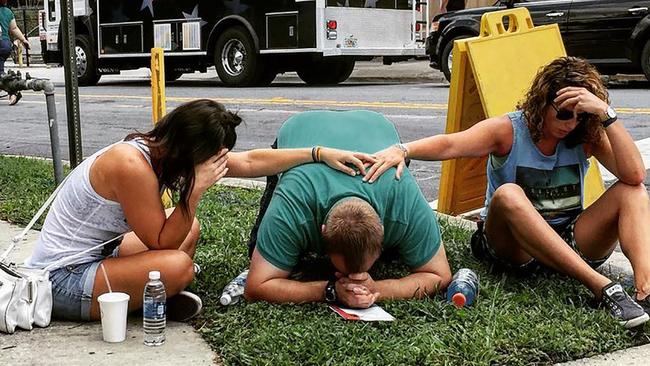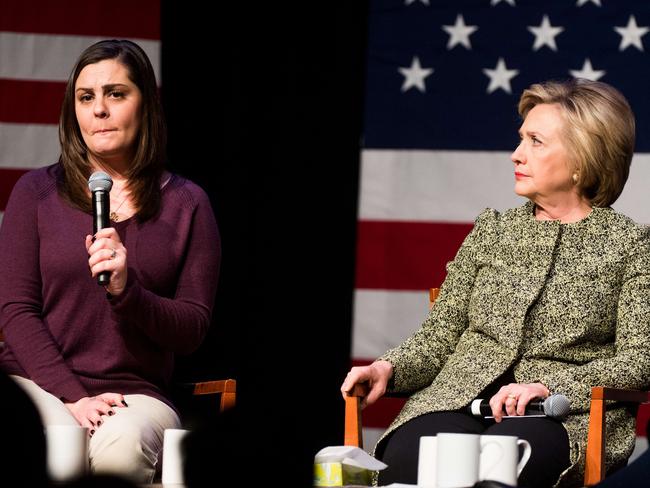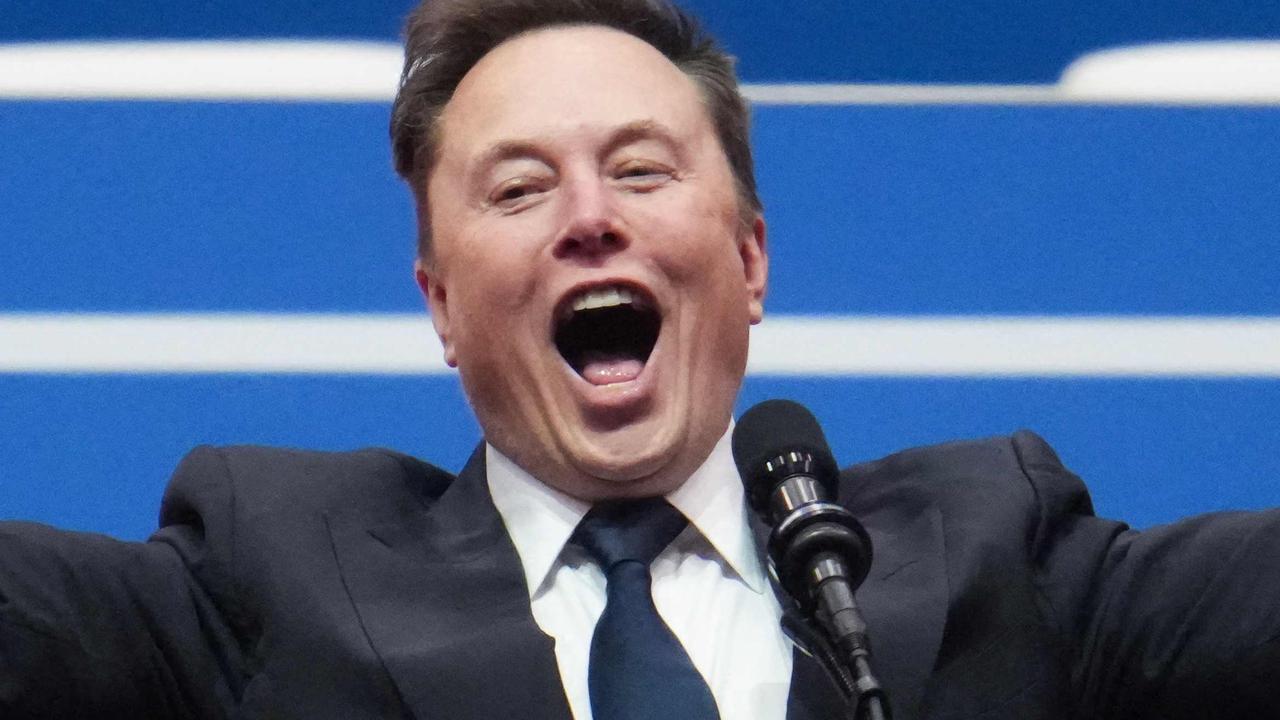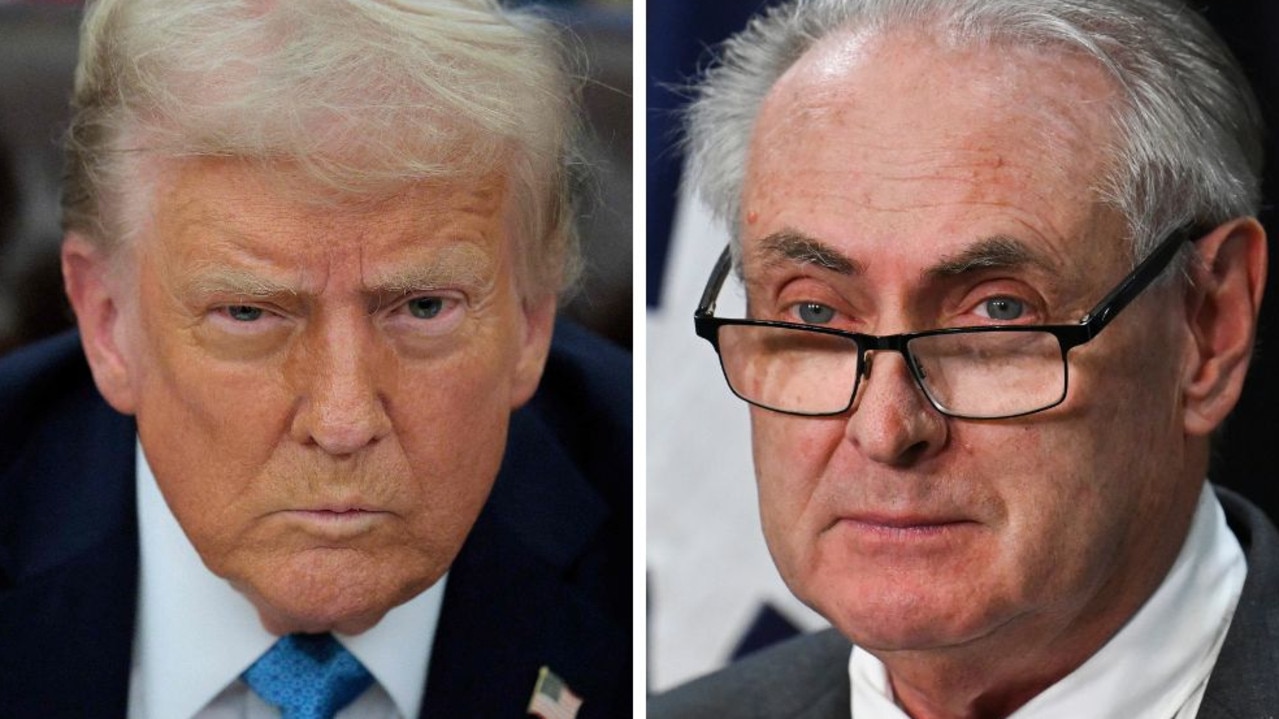War of words over gun control reignites after Orlando shooting
WITH grim predictability, it seems likely that the deadliest mass shooting in US history will do nothing to change their gun laws.

WITH grim predictability, the war of words over gun laws in the US has reignited following the deadliest mass shooting in American history.
After the massacre at a gay nightclub in Orlando on Sunday left 50 dead — including the gunman — and 53 injured, the battle over access to firearms and national security reared its ugly head once more.
Gunman Omar Mateen had twice been investigated by the FBI for possible terrorist ties, and yet — like other mass shooters before him — he was able to legally buy at least two firearms, a federal official said.
In 2013, his co-workers reported him for alleged comments that indicated possible terrorist links and in 2014, he was investigated for possible ties to an American who went to Syria to fight for an extremist group.
Mateen, who was shot dead by police in Pulse nightclub, used a 9mm handgun and an AR-15-style assault rifle for his sickening attack on the venue.
The latter is a firearm with a bloody history as the weapon of choice for mass shooters. It was used by Adam Lanza to kill 20 children aged between six and seven at Sandy Hook elementary school in 2012; by James Holmes for an attack on a Colorado screening of The Dark Knight Rises that killed 12 and injured 70 the same year; and by married couple Syed Rizwan Farook and Tashfeen Malik, who killed 14 and injured 22 in San Bernardino in December.
Yesterday’s devastating attack in Florida took place just 6km from where The Voice star Christina Grimmie was shot dead at an autograph signing on Friday.
Her shooter Kevin Loibl, who turned the gun on himself after killing the 22-year-old singer, had two handguns, two additional loaded magazines and a large hunting knife. It’s unclear how he managed to smuggle the firearm into The Plaza Live venue.
Guns traced in #Orlando shooting: .223 caliber AR type rifle and 9mm semiautomatic pistol. Similar to those pictured pic.twitter.com/Ao5pcLtwBg
— ATF HQ (@ATFHQ) June 12, 2016
AMERICA’S HORRIFYING REACTION
Once again, people across the world are asking the crucial question — surely this senseless mass murder is enough to make the US tighten its firearms laws? But for many Americans, these brutal killings are only evidence for why more citizens should be carrying guns.
While Barack Obama and Hillary Clinton have made statements calling for some kind of action on gun control, others are loudly proclaiming the opposite.
“Check out Chicago with the toughest gun laws in the country and the highest gun violence,” tweeted Boston radio host Glenn Ordway.
Minneapolis security expert Chris Tobkin echoed many Americans when he posted: “Blaming the tool is a red herring away from the ideology that caused the act. Could have been done with a pressure cooker.”
“Terrorists will always commit murder, regardless of our paper laws ...” added rap artists Jawga Boyz.
They also quoted famously pro-gun Donald Trump: “Strict gun laws didn’t save lives in Paris ... It made them sitting ducks.”
Presumptive Republican presidential nominee Trump, along with many gun lobbyists, tried to move the focus to Islam and terrorists. “Appreciate the congrats for being right on radical Islamic terrorism, I don’t want congrats, I want toughness & vigilance. We must be smart!” he tweeted.
President Obama said the Orlando attack was being investigated “as an act of terrorism” and that “we must spare no effort to determine what — if any — inspiration or association this killer may have had with terrorist groups. What is clear is that he was a person filled with hatred.”
In a statement condemning the massacre, he talked about the ease with which people could get their hands on deadly weapons.
“This massacre is therefore a further reminder of how easy it is for someone to get their hands on a weapon that lets them shoot people in a school, or in a house of worship, or a movie theatre, or in a nightclub,” he said.
“And we have to decide if that’s the kind of country we want to be. And to actively do nothing is a decision as well.”
Presumptive Democratic nominee Hillary Clinton called for expanding background checks to sales at gun shows and online purchases, and for reinstating a ban on assault weapons.
Trump has said the existing background check system should be fixed, not expanded, and that assault-weapons bans do not work.
Just last month, a US Representative for Alabama’s 4th Congressional District, Robert Aderholt, argued against banning people on the federal terrorist watch list from buying guns, saying the proposed solution was “only skin deep.”
“Many people find themselves on the terrorist watch list by mistake,” he said. “Something as simple as a mix up of a birth date can put someone on the list and the process to remove a name can take months or even years.
“My fear is that this is an attempt by Democrats to restrict gun sales to law-abiding citizens under the veil of protecting national security. Chipping away at our Second Amendment rights is no way to fight the terrorists who mean us real harm.”
A terrorist can kill just as many people, running his car thru a crowd of people at a parade... gun bans will not solve anything..
— Jawga Boyz (@jawgaboyz) June 13, 2016
Check out Chicago with the toughest gun laws in the country and the highest gun violence https://t.co/5oVfcU3sK6
— Glenn Ordway (@GlennDOrdway) June 12, 2016
Appreciate the congrats for being right on radical Islamic terrorism, I don't want congrats, I want toughness & vigilance. We must be smart!
— Donald J. Trump (@realDonaldTrump) June 12, 2016
"We need to keep guns like the ones used last night out of the hands of terrorists or other violent criminals." —Hillary on the FL attack
— Hillary Clinton (@HillaryClinton) June 12, 2016
The man who killed my best friend was investigated for terrorist ties TWICE...and could legally buy an assault rifle. Show me the logic.
— Brandon Wolf (@bjoewolf) June 12, 2016
WHAT’S WRONG WITH THE US
Things are only getting worse in terms of gun massacres in the United States.
The number of mass shootings tripled from 2011 to 2014, according to an analysis by the Harvard School of Public Health and Northeastern University, and some researchers believe such attacks are contagious, with one shooting increasing the likelihood another will take place within a fortnight.
The Orlando massacre is the 173rd mass shooting of this year, according to MassShootingTracker.org, which counts any incident in which four or more people are shot. There were 372 mass shootings last year, killing 475 people and wounding 1870. That included 64 school shootings, reports campaign group Everytown for Gun Safety.
In total, 13,286 people were killed in the US by firearms in 2015, according to the Gun Violence Archive, and 26,819 people were injured.
The US has five per cent of the world’s population, but 31 per cent of all mass shootings, CNN reports. Of all the murders in the US in 2012, 60 per cent were by firearm, compared with 18.2 per cent in Australia.
There are an estimated 300 million guns in America — almost one for everyone in the population and more than anywhere in the world. The country with the next highest number of guns is India, with 46 million guns spread across a much larger population of more than 1.25 billion.
In more than half of American cases, the shooter had more than one firearm, while in global incidents, the shooter typically had only one gun.
Mr Obama expressed frustration just last week at a televised town hall event in Indiana over the fact the US was able to put people with IS connections of a no-fly list but not prevent them from buying a gun, thanks to lobbyists the National Rifle Association.
An average of 11,385 people died in firearm incidents in the US annually between 2001 and 2011. In the same period, an average of 517 people were killed annually in terror-related attacks.
Both Mr Obama and Mrs Clinton have said the US should look to Australia as an example. In March, former Prime Minister John Howard reiterated the “incontestable” fact gun-related homicides fell significantly after he introduced strict laws following the Port Arthur massacre.
But his words appear to have fallen on deaf ears.

WHY NOTHING IS LIKELY TO CHANGE
The power of the gun lobby in the US is remarkable.
While polls suggest a majority of people in the US support measures such as background checks, a federal gun purchase database and a ban on assault-style weapons such as the AR-15, such measures have been repeatedly defeated at the highest level of politics.
Some states have tightened their gun laws in recent years, but others have relaxed them, and firearms can cross state lines with ease.
Florida has some of the softest rules, with no restrictions on the design or magazine capacity of the AR-15 and other semiautomatic rifles of the type Mateen used. It is one of more than two dozen in which authorities must grant concealed-carry licenses for applicants, and show competency with a firearm, according to the Wall Street Journal.
Pew Research Centre polls taken after high-profile mass shootings suggest Americans typically favour more gun ownership after such incidents. Firearms massacres are often followed by a spike in gun purchases.
The one exception was the slaughter of children at Sandy Hook in Connecticut, when there was a sense things might be different — until a bill to expand background checks died in the Senate.
Last year, Mr Obama said his failure to pass “common sense gun safety laws” was the greatest frustration of his presidency.
In his speech last week, he noted that Congress had prevented the US Centers for Disease Control from studying gun violence as a public health problem.
He has vowed to take executive action to increase background checks on people buying guns, a standpoint supported by Mrs Clinton, who promised to “take on the gun lobby and fight for common sense reforms to keep guns away from terrorists, domestic abusers and other violent criminals.”
Mr Trump, who has the NRA’s endorsement, told the group in May that his Democratic opponent wanted “to abolish the Second Amendment,” the section of the constitution that enshrines the right to bear arms.
Even if the Democrats win back the Senate in November, Mrs Clinton would only have half a chance of passing such reforms through a House led by Republicans, according to The Independent, since they often appear motivated by maintaining their NRA “A” ratings on gun rights.
Critics of tougher gun laws say more restrictions wouldn’t stop mass shootings and would unfairly restrict constitutional rights.
Republicans often say Congress should react to mass shootings by overhauling the country’s mental health system, according to the Wall Street Journal. But while many shooters in the US are found to be mentally ill, other studies have shown the estimated number of cases of mental illness hasn’t risen significantly while the number of mass shootings has soared.
It’s one of America’s most fraught political issues, with Conservative Republicans are more likely than others to base their vote on where a candidate stands on gun policy, according to Pew.
While 47 per cent would not vote for a candidate who disagrees with them on gun policy, only 37 per cent of liberal Democrats and 31 per cent of conservative/moderate Democrats would refuse to vote for a candidate who disagreed with them on the issue.




